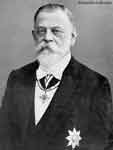|
|
Hermann Carl Vogel (April 3, 1841 – August 13, 1907) was a German astronomer. He was born in Leipzig, Kingdom of Saxony. Vogel pioneered the use of the spectroscope in astronomy. He applied this instrument to chemically analyze planetary atmospheres and to determine the Sun's rotational period using the Doppler effect. In 1882, Vogel became the Director at the Astrophysical Observatory Potsdam. and he is best known for a discovery he made there in 1890. Vogel found that the spectra of certain stars shifted slightly over time, moving toward the red and then later toward the blue. His interpretation of this result was that the star was moving toward and then away from the Earth, and that the accompanying spectral shifts were the result of the Doppler effect. These stars appeared to be orbiting around a hidden center of mass, and thus they were double-star systems. However, in each case the companion star could not be resolved using a telescope, and so these double-star systems were designated spectroscopic binaries. By obtaining periodic Doppler shifts in the components of Algol, Vogel proved that the latter was a binary star; thus, Algol was one of the first known spectroscopic binaries (and it is also known to be an eclipsing binary). Honors Awards * Gold Medal of the Royal Astronomical Society (1893) Named after him * The crater Vogel on the Moon
* Frost, E. B. (1908). "Hermann Carl Vogel". The Astrophysical Journal 27: 1 – 11. doi:10.1086/141520. http://adsabs.harvard.edu/abs/1908ApJ....27....1F. Retrieved 2008-04-19.
* Short biography Retrieved from "http://en.wikipedia.org/"
|
|

